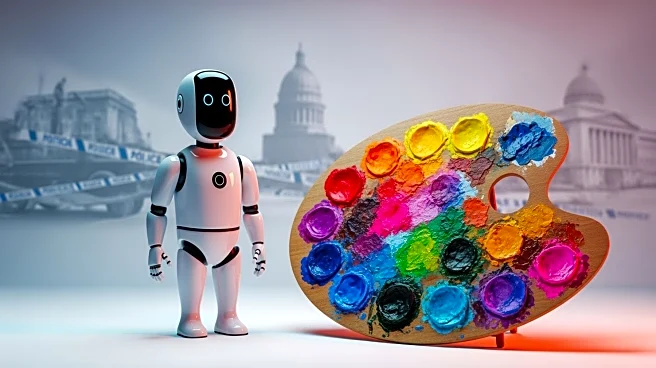What's Happening?
Netflix Co-CEO Ted Sarandos made a statement on October 21, 2025, during a Netflix earnings call, asserting that 'it takes a great artist to make something great.' This comment was made in the context
of discussing generative AI and its impact on user-generated content (UGC). Sarandos framed AI as a potential threat to UGC while emphasizing the importance of human storytellers in professional filmmaking. The statement was included in Netflix's shareholder letter, which described generative AI as 'empowering' for creators. The remark has sparked controversy among filmmakers and talent groups, who view it as dismissive of the potential threats AI poses to creative jobs. Meanwhile, investors reacted to the broader earnings news, resulting in a 7% drop in Netflix's stock in after-hours trading.
Why It's Important?
The statement by Sarandos highlights the ongoing debate over the role of AI in the creative industry. Filmmakers and talent groups, including notable figures like Guillermo del Toro, argue that AI threatens the craftsmanship and artistry of human creators. On the other hand, Netflix executives are attempting to reassure investors by promoting AI as a tool for growth and efficiency. This debate is significant as it touches on broader issues of economic control and creative labor, with potential implications for union negotiations and industry standards. The reaction from Wall Street and creative communities indicates a divide in priorities, with economic stakeholders focusing on cost savings and growth, while creators emphasize the preservation of artistic integrity.
What's Next?
The controversy surrounding Sarandos' comment is likely to influence upcoming negotiations between studios and creative unions. As the industry grapples with the integration of AI, there may be increased pressure for clearer contract language and studio policies regarding AI usage. The response from creators and unions could lead to more public discussions and tests of AI's limits in the creative process. If studios continue to prioritize AI-driven strategies, creators may push back harder in bargaining sessions or consider alternative paths to protect their roles in the industry.
Beyond the Headlines
The debate over AI in the creative industry raises ethical questions about the value of human creativity versus technological efficiency. It also reflects broader cultural shifts as industries adapt to technological advancements. The long-term implications could include changes in how creative work is valued and compensated, as well as shifts in the power dynamics between creators and corporations. As AI becomes more integrated into creative processes, the industry may need to redefine what constitutes originality and authorship.









